Introduction
Think of your most time-consuming affiliate marketing tasks—creating content, tracking links, or crafting emails—could be handled automatically.
Sounds too good to be true, right?
But here’s the thing: “it’s not”.
This isn’t wishful thinking; it’s possible with AI. Your time becomes more flexible because these tools both boost your efficiency at work while delivering better outcomes.
In this guide, we’ll explore the Best AI Tools for Affiliate Marketing and show how they can help you achieve more in less time.
If you’re a seasoned marketer or just researching with AI, this article provides actionable advice tailored to your needs. We have discussed about both the free and paid tools here in the blog.
Reasons of using ai in affiliate marketing
AI simplifies tasks that often take hours.
It creates content, analyzes data, and personalizes customer experiences automatically.
These tools also help you make informed decisions based on real-time insights.
(For example, identifying top-performing products becomes quicker with AI.)
There are many more advantages. We cant explain all of it. But these are the main reasons.
How to Pick the Right AI Tool?
Choosing the right tool depends on your goals.
Do you need help with content creation, email marketing, or ad optimization?
Then start by defining your focus area.
If you’re working on a tight budget, look for free or entry-level tools.
For advanced users, premium plans often come with features like detailed analytics or integrations.
Always prioritize ease of use—complex tools can waste more time than they save.
Best AI Tools for Affiliate Marketing
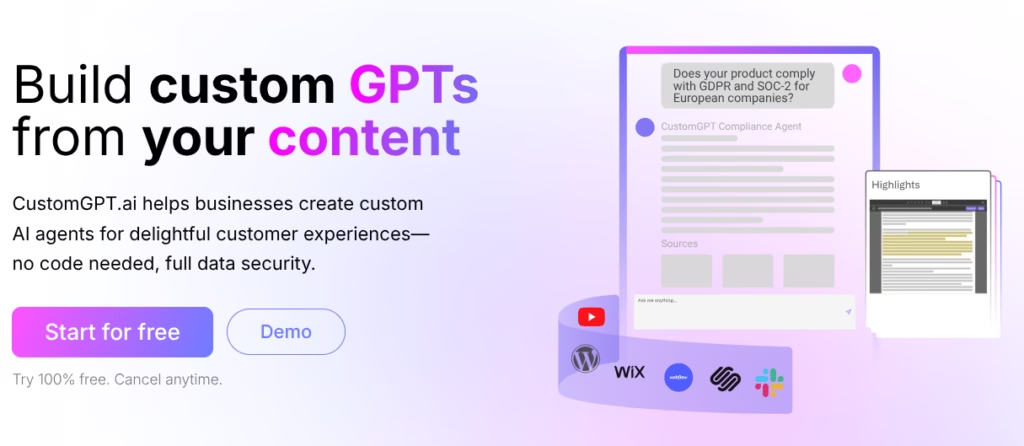
1. CustomGPT.ai
- What It Does: Helps create personalized content and automates repetitive tasks. It’s great for building AI-powered chatbots or FAQ sections.
- Pros:
- Easy to set up, even for beginners.
- Generates tailored content for specific audiences.
- Integrates seamlessly with other tools.
- Offers flexibility for various affiliate niches.
- Cons:
- Advanced features can be expensive.
- Requires some setup time for complex use cases.
- Limited free plan options.
- Pro Tip: Use it to craft unique landing pages or product-specific content that matches audience preferences.
- Real-Life Example: An affiliate marketer used CustomGPT.ai to set up a chatbot answering common product queries, boosting conversions by 15%.
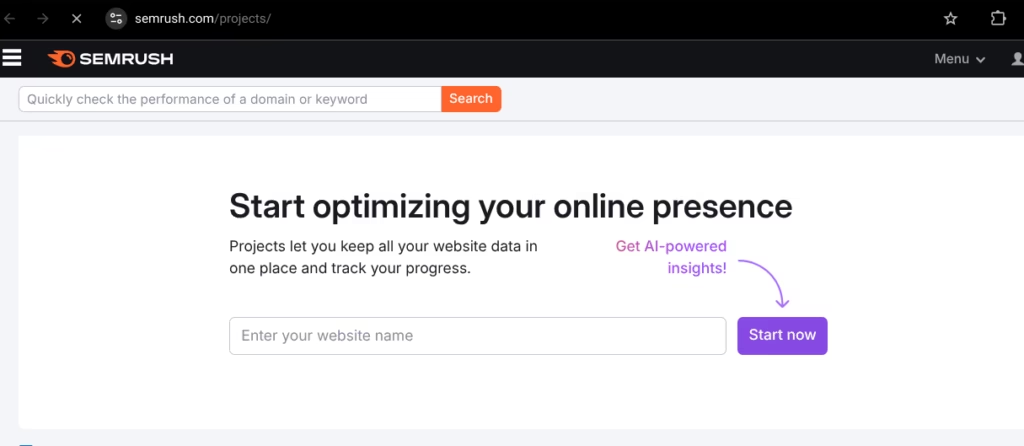
2. Semrush
- What It Does: Offers keyword research, content optimization, and SEO tools.
- Pros:
- Provides in-depth keyword research and competitor analysis.
- Includes an SEO Writing Assistant for real-time optimization.
- Offers tools to track and improve website performance.
- Supports multi-channel campaign management.
- Cons:
- Expensive for smaller teams or solo marketers.
- Can feel overwhelming due to its extensive features.
- Requires training to maximize its potential.
- Pro Tip: Use the “Keyword Magic Tool” to find long-tail keywords with low competition.
- Real-Life Example: A blog about fitness products increased organic traffic by 40% using Semrush’s keyword gap analysis.
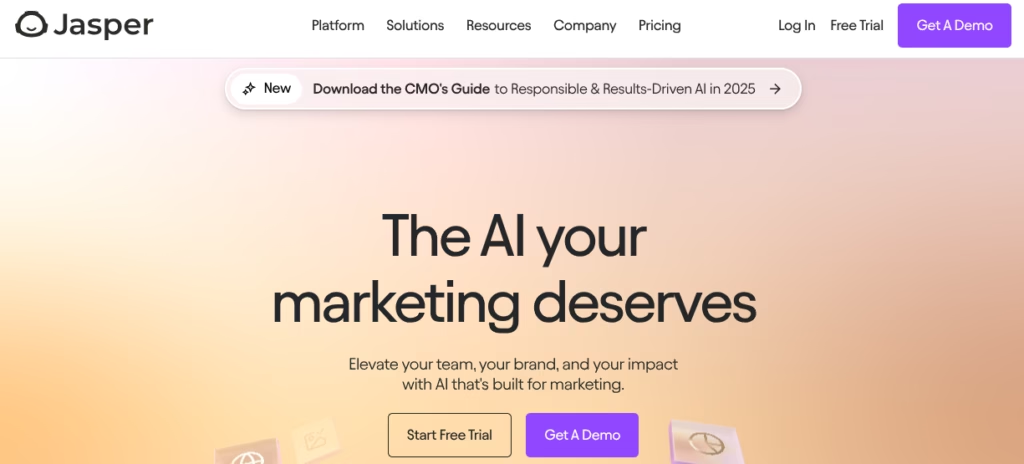
3. Jasper
- What It Does: Generates high-quality, SEO-friendly content.
- Pros:
- Quickly creates content tailored to your audience.
- Adapts to your brand’s tone and style.
- Supports multiple languages for global campaigns.
- Offers templates for various content types.
- Cons:
- Niche topics may require more manual input.
- Limited features in the free trial.
- Higher-tier plans can be costly.
- Pro Tip: Use “Boss Mode” to quickly create product descriptions that rank well on search engines.
- Real-Life Example: An affiliate in the tech niche reduced blog creation time by half with Jasper.
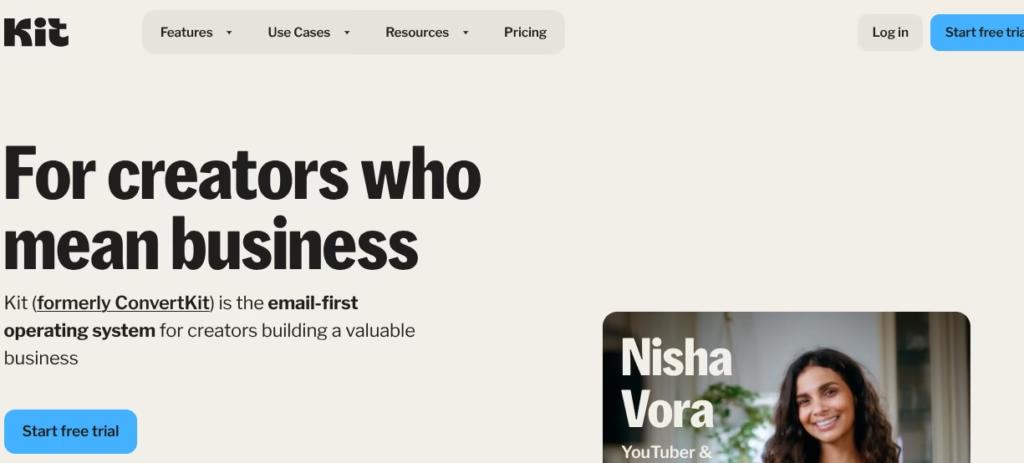
4. ConvertKit
- What It Does: Automates email marketing with segmentation and triggered emails.
- Pros:
- User-friendly interface ideal for beginners.
- Advanced audience segmentation for targeted campaigns.
- Allows creation of customizable email sequences.
- Provides automation for lead nurturing.
- Cons:
- Limited template options compared to competitors.
- Basic plans lack detailed analytics.
- May not scale well for larger businesses.
- Pro Tip: Set up a welcome email sequence for new subscribers to build trust immediately.
- Real-Life Example: A food blogger used ConvertKit to send weekly deals to segmented audiences, increasing click-through rates by 20%.
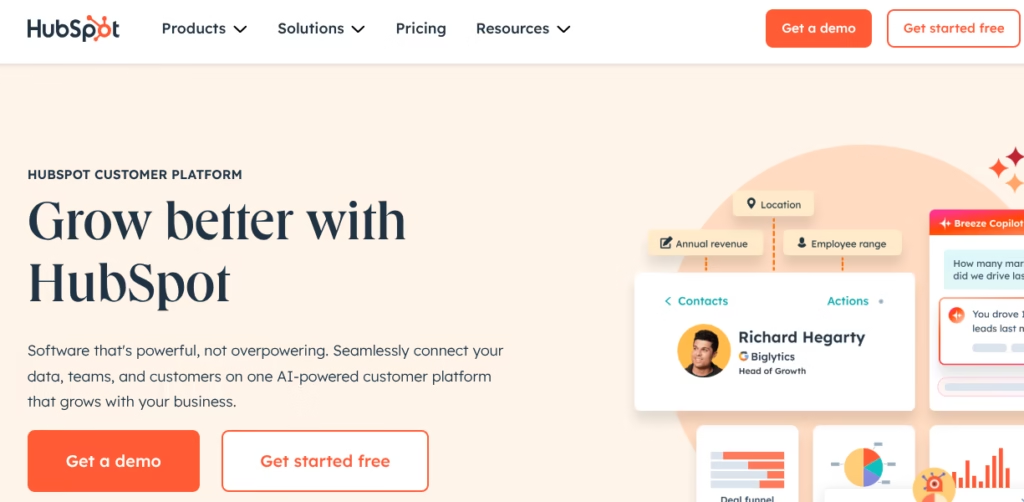
5. HubSpot
- What It Does: Combines marketing automation with CRM capabilities.
- Pros:
- Comprehensive suite of tools for marketing, sales, and customer management.
- Includes predictive analytics to optimize campaigns.
- Simplifies collaboration across teams with integrated platforms.
- Offers robust tracking for affiliate links and customer interactions.
- Cons:
- Pricing may deter smaller teams or solo marketers.
- Steep learning curve for first-time users.
- Some advanced features require premium plans.
- Pro Tip: Track affiliate links and customer interactions through its CRM for better insights.
- Real-Life Example: A marketer running multiple campaigns saw a 25% increase in ROI after integrating HubSpot.
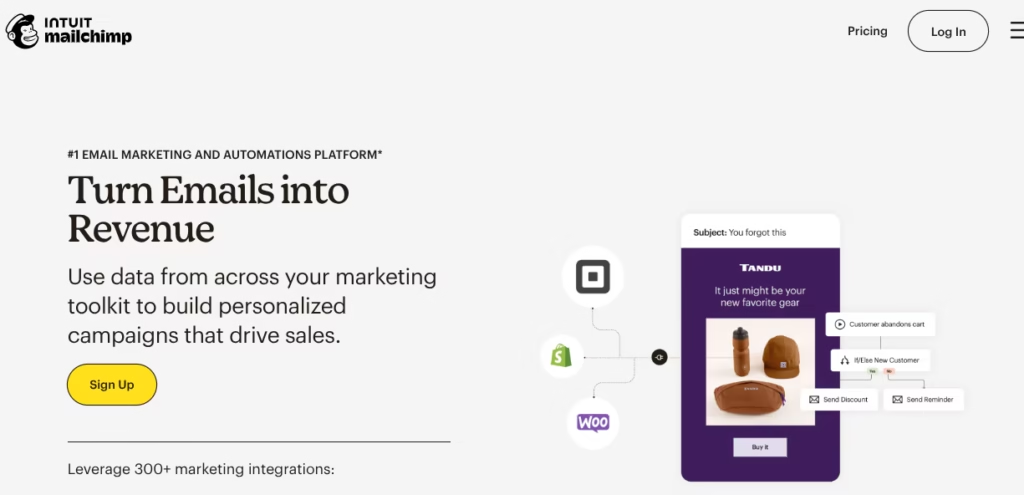
6. Mailchimp
- What It Does: Provides tools for email campaigns and reporting.
- Pros:
- Affordable entry-level plans for beginners.
- User-friendly interface with drag-and-drop functionality.
- Offers automation for recurring campaigns.
- Provides basic analytics to track campaign performance.
- Cons:
- Limited customization options in lower-tier plans.
- Advanced automation features are locked behind premium plans.
- Not ideal for highly complex workflows.
- Pro Tip: Test email subject lines to improve open rates.
- Real-Life Example: An affiliate for beauty products used Mailchimp’s automation to recover abandoned carts, boosting sales by 10%.
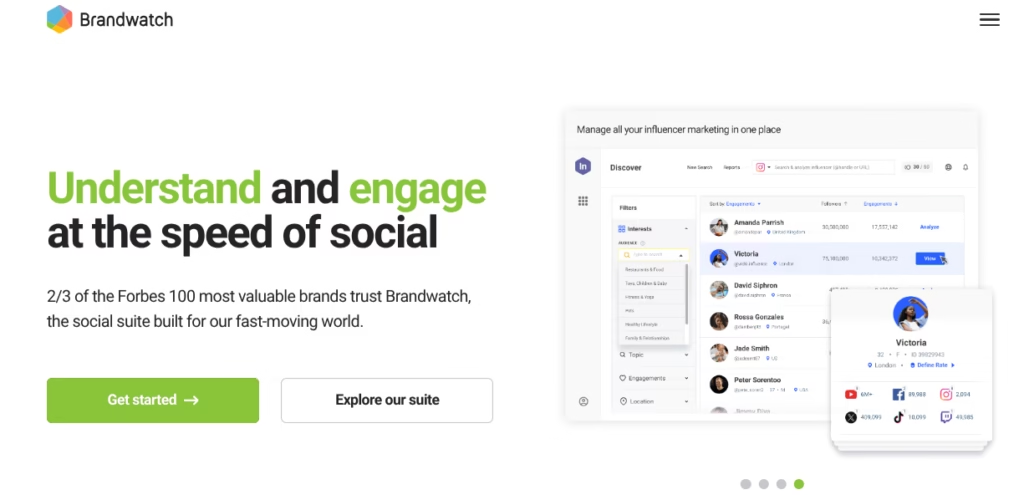
7. Brandwatch
- What It Does: Focuses on social listening and performance analysis.
- Pros:
- Tracks brand mentions and social trends in real time.
- Offers detailed campaign performance insights.
- Customizable dashboards for tracking key metrics.
- Helps identify gaps in competitor strategies.
- Cons:
- High price point for advanced features.
- May overwhelm small businesses with its complexity.
- Requires training to utilize its full potential.
- Pro Tip: Monitor competitor strategies and adjust your campaigns accordingly.
- Real-Life Example: A marketer discovered a trending product category through Brandwatch and increased sales by focusing ads on it.
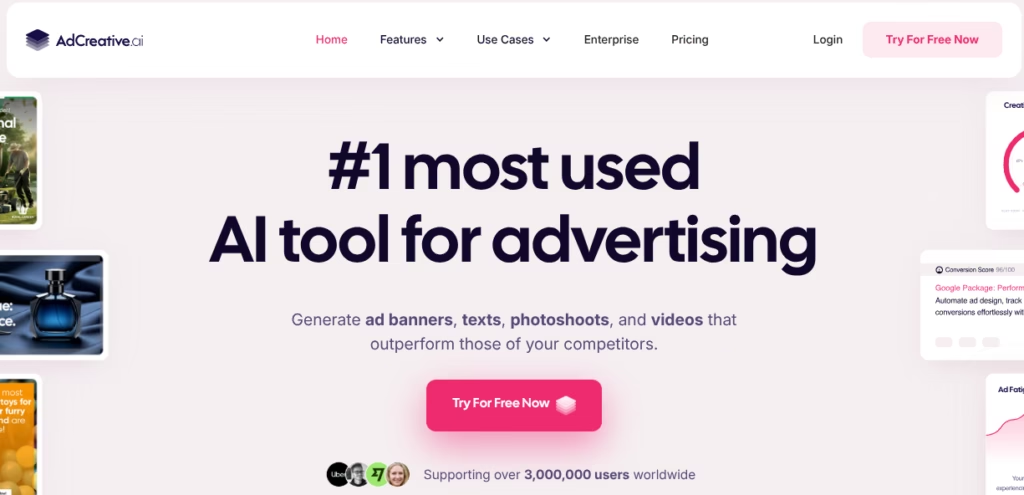
8. AdCreative.ai
- What It Does: Creates ad creatives designed to convert.
- Pros:
- Generates multiple ad versions for quick testing.
- Uses data-driven insights to improve ad performance.
- Offers A/B testing for optimizing creatives.
- Speeds up the ad creation process significantly.
- Cons:
- Free plans come with limited functionality.
- Focused primarily on paid campaigns, not organic content.
- Can lack depth for highly niche ad requirements.
- Pro Tip: Generate multiple ad versions and test them to find the best-performing creative.
- Real-Life Example: An affiliate selling gadgets saw a 30% increase in ad performance using AI-generated visuals.
comparison table for the AI tools used in affiliate marketing
| AI Tool | Price Range | Free Availability | Pros | Cons |
|---|---|---|---|---|
| CustomGPT.ai | $0 (7-day free trial) to $499/month | Yes (limited free plan) | Easy setup, tailored content generation, flexible integration | Advanced features can be expensive, limited free options |
| Semrush | $117.33 to $416.66/month | Yes (14-day free trial) | In-depth keyword research, SEO Writing Assistant | Expensive for smaller teams, steep learning curve |
| Jasper | $29 to $499/month | Yes (5-day free trial) | Quickly creates SEO-friendly content, supports multiple languages | Limited features in the free trial, costly higher-tier plans |
| ConvertKit | $0 (for up to 1,000 subscribers) to $59/month | Yes (free plan available) | User-friendly interface, advanced segmentation | Limited templates, basic plans lack detailed analytics |
| HubSpot | Free to $3,600/month | Yes (limited free plan) | Comprehensive suite of tools, robust tracking | Pricing may deter smaller teams, steep learning curve |
| Mailchimp | Free to $350/month | Yes (free plan available) | Affordable for beginners, automation features | Limited customization in lower-tier plans |
| Brandwatch | Custom pricing (no free plan) | No | Real-time tracking of brand mentions, customizable dashboards | High price point for advanced features |
| AdCreative.ai | $39 to $599/month | No | Generates multiple ad versions quickly, A/B testing | Limited functionality in free plans |
Benefits of AI for Affiliate Marketing
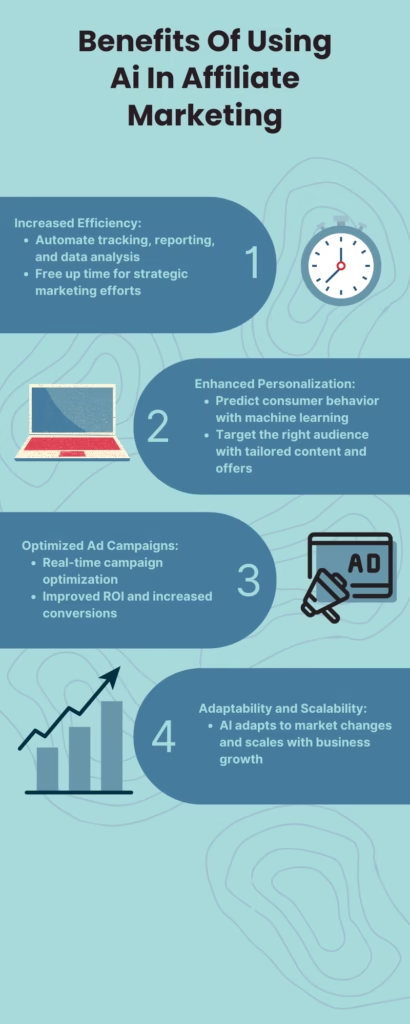
- Content Creation: AI tools produce blog posts, product descriptions, and social media updates in minutes.
- SEO Optimization: Tools like Jasper ensure your content ranks higher.
- Product Research: Find trending products quickly and efficiently.
- Email Marketing: Automate and personalize campaigns for better engagement.
- Customer Support: Chatbots enhance user experience and handle queries 24/7.
- Data Insights: Analyze campaign performance and improve strategies.
Ethical Considerations and Risks
AI can improve efficiency but comes with risks.
Ensure transparency by labeling AI-generated content.
Prioritize user privacy and comply with data regulations (like GDPR).
Avoid over-reliance on AI to maintain authenticity.
What’s Next for AI in Affiliate Marketing?
AI tools are getting smarter, offering real-time personalization and predictive capabilities.
By staying updated, you’ll keep your edge in the competitive affiliate marketing space.
Expect more automation—creating content, analyzing data, and personalizing customer experiences with ease.
As AI tools evolve, they’ll help you make faster, data-driven decisions and identify top-performing products in real-time.
Conclusion
AI tools are changing affiliate marketing. They save time, improve performance, and let you focus on what matters. Explore these tools, experiment with features, and see how they can grow your affiliate business. The tools are here—it’s time to use them effectively.
FAQs About Affiliate Marketing and AI Tools
- What’s affiliate marketing?
- It’s when you promote someone else’s products and earn a commission for every sale or lead you generate.
- What’s affiliate marketing?
- It’s when you promote someone else’s products and earn a commission for every sale or lead you generate.
- What are some top AI tools for affiliate marketers?
- We have discussed It avobe.
- How do I analyze my audience with AI?
- Use AI analytics tools to dig into user behavior and preferences, so you can tailor your marketing efforts more effectively.
- What’s the role of machine learning in this space?
- Machine learning helps optimize your ads and predict trends based on data, making your campaigns smarter over time.
- How do I pick the right affiliate program?
- Look for good commission rates, products that fit your audience, solid support, and a reputable company behind it.
- Why is transparency important in affiliate marketing?
- Being open about your affiliate links builds trust with your audience and keeps you compliant with regulations.
- Can AI tools help with SEO?
- Absolutely! They can find the best keywords and optimize your content to boost your visibility online.
- How can I track my performance in affiliate marketing?
- Use analytics tools to keep an eye on clicks, conversions, and overall success of your campaigns.
- What strategies should I use for successful affiliate marketing?
- We have discussed It avobe.
If it was helpful please let us know. And do you liked our explaining/writing style?
Let us know in the comments.



